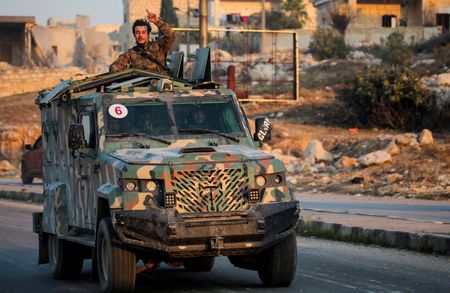By Andrew Mills
DOHA (Reuters) -Qatari diplomats spoke with Syria’s leading rebel faction, Hayat Tahrir al-Sham, on Monday, an official briefed on the developments told Reuters, as regional states race to open contact with the group after its rapid offensive toppled Bashar al-Assad.
Qatar plans to speak with Mohamed al-Bashir, an HTS leader, on Tuesday, the day after he was appointed to lead Syria’s transitional administration, the official said.
“The focus is on the need for HTS and other groups to maintain calm and preserve Syria’s public institutions during the transition period,” the official said.
Governments across the region are scrambling to forge new links with HTS and other rebel groups involved in the offensive that seized control of much of Syria. Assad fled to Russia, after 13 years of civil war and more than 50 years of his family’s rule.
Qatar’s foreign ministry did not immediately respond to a Reuters requests for comment about the contacts with HTS, a group formerly allied with Al Qaeda and which is designated a terrorist organization by the U.S., European Union, Turkey and the U.N.
Mohammed Al-Khulaifi, Minister of State at Qatar’s foreign ministry, said late on Monday that the Gulf Arab state is communicating with “various parties on the ground” in Syria, without specifying who.
“Qatar has always kept its doors open to everyone, in line with its foreign policy,” Khulaifi said in comments broadcast on Al Jazeera’s Arabic network.
Assad’s main regional ally Iran also opened a direct line of communication with rebels in Syria’s new leadership, a senior Iranian official told Reuters, citing the need to “prevent a hostile trajectory” between the countries. It was not clear if Iran’s contacts were with HTS or another Syrian rebel faction.
Qatar’s outreach to HTS follows a meeting hosted by the Qatari prime minister late on Saturday, which included foreign ministers from Saudi Arabia and Egypt, as well as Syria’s neighbours Turkey, Jordan and Iraq, alongside top diplomats from Iran and Russia, another Assad ally.
Hours before Assad fled Damascus, the group of officials reached consensus that communicating with HTS was required in order to stabilise Syria, the official said, adding that it was a priority to ensure extremist groups like Islamic State did not gain a foothold.
The senior Iranian official said several countries at Saturday’s meeting — including Turkey, Saudi Arabia and Qatar — offered to open channels to the Syrian rebel leadership.
Qatar, a tiny Gulf Arab country and major ally of Washington, has a track record mediating between Western countries and their foes like Iran or militant groups like Hamas and the Taliban.
The foreign ministries of Qatar, Egypt, Turkey, Jordan, Russia, a foreign affairs adviser to Iraq’s prime minister and Saudi Arabia’s international media office did not respond to Reuters’ requests for comment about Saturday’s meeting.
Russian news agencies reported that Syrian rebel representatives guaranteed Moscow that its military bases and diplomatic institutions in Syria would remain safe. It was not clear which Syrian faction issued the guarantees.
Turkish Foreign Minister Hakan Fidan said on Monday that Ankara was coordinating with all “regional actors and parties”, without naming HTS.
(Reporting and writing by Andrew Mills in Doha; Additional reporting by Parisa Hafezi in Dubai, Timour Azhari in Damascus, Nafisa Eltahir in Cairo, Jonathan Spicer in Istanbul, Guy Faulconbridge in Moscow and Pesha Magid in Riyadh; editing by Deepa Babington and Alistair Bell)
